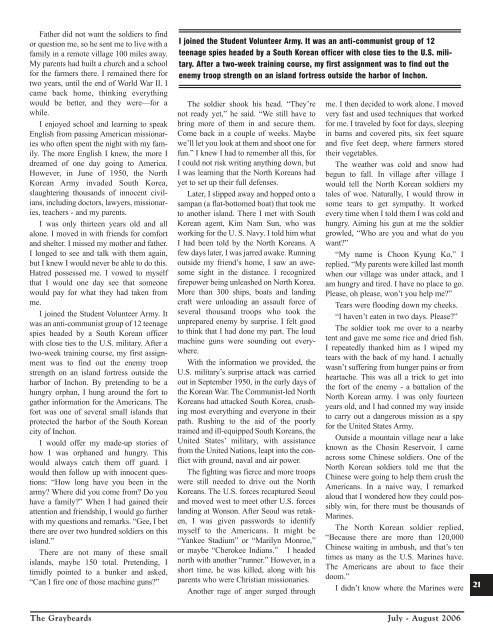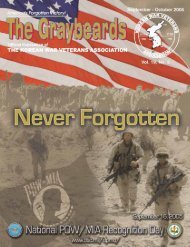Jul/Aug 2006 - Korean War Veterans Association
Jul/Aug 2006 - Korean War Veterans Association
Jul/Aug 2006 - Korean War Veterans Association
Create successful ePaper yourself
Turn your PDF publications into a flip-book with our unique Google optimized e-Paper software.
Father did not want the soldiers to find<br />
or question me, so he sent me to live with a<br />
family in a remote village 100 miles away.<br />
My parents had built a church and a school<br />
for the farmers there. I remained there for<br />
two years, until the end of World <strong>War</strong> II. I<br />
came back home, thinking everything<br />
would be better, and they were—for a<br />
while.<br />
I enjoyed school and learning to speak<br />
English from passing American missionaries<br />
who often spent the night with my family.<br />
The more English I knew, the more I<br />
dreamed of one day going to America.<br />
However, in June of 1950, the North<br />
<strong>Korean</strong> Army invaded South Korea,<br />
slaughtering thousands of innocent civilians,<br />
including doctors, lawyers, missionaries,<br />
teachers - and my parents.<br />
I was only thirteen years old and all<br />
alone. I moved in with friends for comfort<br />
and shelter. I missed my mother and father.<br />
I longed to see and talk with them again,<br />
but I knew I would never be able to do this.<br />
Hatred possessed me. I vowed to myself<br />
that I would one day see that someone<br />
would pay for what they had taken from<br />
me.<br />
I joined the Student Volunteer Army. It<br />
was an anti-communist group of 12 teenage<br />
spies headed by a South <strong>Korean</strong> officer<br />
with close ties to the U.S. military. After a<br />
two-week training course, my first assignment<br />
was to find out the enemy troop<br />
strength on an island fortress outside the<br />
harbor of Inchon. By pretending to be a<br />
hungry orphan, I hung around the fort to<br />
gather information for the Americans. The<br />
fort was one of several small islands that<br />
protected the harbor of the South <strong>Korean</strong><br />
city of Inchon.<br />
I would offer my made-up stories of<br />
how I was orphaned and hungry. This<br />
would always catch them off guard. I<br />
would then follow up with innocent questions:<br />
“How long have you been in the<br />
army? Where did you come from? Do you<br />
have a family?” When I had gained their<br />
attention and friendship, I would go further<br />
with my questions and remarks. “Gee, I bet<br />
there are over two hundred soldiers on this<br />
island.”<br />
There are not many of these small<br />
islands, maybe 150 total. Pretending, I<br />
timidly pointed to a bunker and asked,<br />
“Can I fire one of those machine guns?”<br />
I joined the Student Volunteer Army. It was an anti-communist group of 12<br />
teenage spies headed by a South <strong>Korean</strong> officer with close ties to the U.S. military.<br />
After a two-week training course, my first assignment was to find out the<br />
enemy troop strength on an island fortress outside the harbor of Inchon.<br />
The soldier shook his head. “They’re<br />
not ready yet,” he said. “We still have to<br />
bring more of them in and secure them.<br />
Come back in a couple of weeks. Maybe<br />
we’ll let you look at them and shoot one for<br />
fun.” I knew I had to remember all this, for<br />
I could not risk writing anything down, but<br />
I was learning that the North <strong>Korean</strong>s had<br />
yet to set up their full defenses.<br />
Later, I slipped away and hopped onto a<br />
sampan (a flat-bottomed boat) that took me<br />
to another island. There I met with South<br />
<strong>Korean</strong> agent, Kim Nam Sun, who was<br />
working for the U. S. Navy. I told him what<br />
I had been told by the North <strong>Korean</strong>s. A<br />
few days later, I was jarred awake. Running<br />
outside my friend’s home, I saw an awesome<br />
sight in the distance. I recognized<br />
firepower being unleashed on North Korea.<br />
More than 300 ships, boats and landing<br />
craft were unloading an assault force of<br />
several thousand troops who took the<br />
unprepared enemy by surprise. I felt good<br />
to think that I had done my part. The loud<br />
machine guns were sounding out everywhere.<br />
With the information we provided, the<br />
U.S. military’s surprise attack was carried<br />
out in September 1950, in the early days of<br />
the <strong>Korean</strong> <strong>War</strong>. The Communist-led North<br />
<strong>Korean</strong>s had attacked South Korea, crushing<br />
most everything and everyone in their<br />
path. Rushing to the aid of the poorly<br />
trained and ill-equipped South <strong>Korean</strong>s, the<br />
United States’ military, with assistance<br />
from the United Nations, leapt into the conflict<br />
with ground, naval and air power.<br />
The fighting was fierce and more troops<br />
were still needed to drive out the North<br />
<strong>Korean</strong>s. The U.S. forces recaptured Seoul<br />
and moved west to meet other U.S. forces<br />
landing at Wonson. After Seoul was retaken,<br />
I was given passwords to identify<br />
myself to the Americans. It might be<br />
“Yankee Stadium” or “Marilyn Monroe,”<br />
or maybe “Cherokee Indians.” I headed<br />
north with another “runner.” However, in a<br />
short time, he was killed, along with his<br />
parents who were Christian missionaries.<br />
Another rage of anger surged through<br />
me. I then decided to work alone. I moved<br />
very fast and used techniques that worked<br />
for me. I traveled by foot for days, sleeping<br />
in barns and covered pits, six feet square<br />
and five feet deep, where farmers stored<br />
their vegetables.<br />
The weather was cold and snow had<br />
begun to fall. In village after village I<br />
would tell the North <strong>Korean</strong> soldiers my<br />
tales of woe. Naturally, I would throw in<br />
some tears to get sympathy. It worked<br />
every time when I told them I was cold and<br />
hungry. Aiming his gun at me the soldier<br />
growled, “Who are you and what do you<br />
want?”<br />
“My name is Choon Kyung Ko,” I<br />
replied. “My parents were killed last month<br />
when our village was under attack, and I<br />
am hungry and tired. I have no place to go.<br />
Please, oh please, won’t you help me?”<br />
Tears were flooding down my cheeks.<br />
“I haven’t eaten in two days. Please?”<br />
The soldier took me over to a nearby<br />
tent and gave me some rice and dried fish.<br />
I repeatedly thanked him as I wiped my<br />
tears with the back of my hand. I actually<br />
wasn’t suffering from hunger pains or from<br />
heartache. This was all a trick to get into<br />
the fort of the enemy - a battalion of the<br />
North <strong>Korean</strong> army. I was only fourteen<br />
years old, and I had conned my way inside<br />
to carry out a dangerous mission as a spy<br />
for the United States Army.<br />
Outside a mountain village near a lake<br />
known as the Chosin Reservoir, I came<br />
across some Chinese soldiers. One of the<br />
North <strong>Korean</strong> soldiers told me that the<br />
Chinese were going to help them crush the<br />
Americans. In a naive way, I remarked<br />
aloud that I wondered how they could possibly<br />
win, for there must be thousands of<br />
Marines.<br />
The North <strong>Korean</strong> soldier replied,<br />
“Because there are more than 120,000<br />
Chinese waiting in ambush, and that’s ten<br />
times as many as the U.S. Marines have.<br />
The Americans are about to face their<br />
doom.”<br />
I didn’t know where the Marines were<br />
21<br />
The Graybeards<br />
<strong>Jul</strong>y - <strong>Aug</strong>ust A<br />
<strong>2006</strong>

















